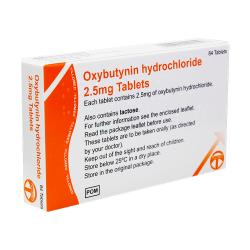Oxybutynin


Oxybutynin helps treat symptoms of urinary incontinence by relaxing the bladder muscles and lessening contractions and spasms. The medication helps those suffering from incontinence and allows users to control of their overactive bladders.
Oxybutynin contains the active ingredient Oxybutynin hydrochloride.
What is Oxybutynin?
Oxybutynin helps treat symptoms of urinary incontinence by relaxing the bladder muscles. The medication helps those suffering from incontinence and allows users to control of their overactive bladders.
How does it work?
Oxybutynin works by reducing and relieving symptoms of urinary incontinence. The active ingredient Oxybutynin hydrochloride helps the bladder muscles relax and lessening contractions and spasms.
Is Oxybutynin suitable for me?
Oxybutynin can be used to treat overactive bladders. However it may not be suitable for you if the following applies to you:
Always take Oxybutynin exactly as prescribed by your doctor or advised by the pharmacist.
If unsure of how to take Oxybutynin or if you have further questions, please consult your doctor or pharmacist.
Commonly Used Dosage Guidelines for Premarin.
The starting dosage is 5mg, around 2 to 3 times a day or as recommended by a healthcare provider.
Viagra connect may not be safe if taken with other medication or recreational drugs. Please inform the prescriber if you are taking any of the listed medications. Make sure to read the patient information leaflet.
DO NOT take Oxybutynin if taking:
The above-listed warnings are not exhaustive, please consult a doctor, pharmacist or nurse if you have further questions on the use of this medication or potential interactions with other medicines.
All medications can cause potential side effects, below we have listed some potential side effects, however, these do not always occur.
To read the Oxybutynin Patient Leaflet, click here.
The information provided in this blog post is intended for general informational purposes only and should not be considered as medical advice, diagnosis, or treatment. Welzo does not endorse or sell the medication discussed, nor do we recommend using this information as a substitute for professional healthcare. Always consult with a qualified healthcare provider before making any decisions regarding your health or medical treatment. Welzo assumes no responsibility for any actions taken based on the information provided in this blog.










Plus get the inside scoop on our latest content and updates in our monthly newsletter.